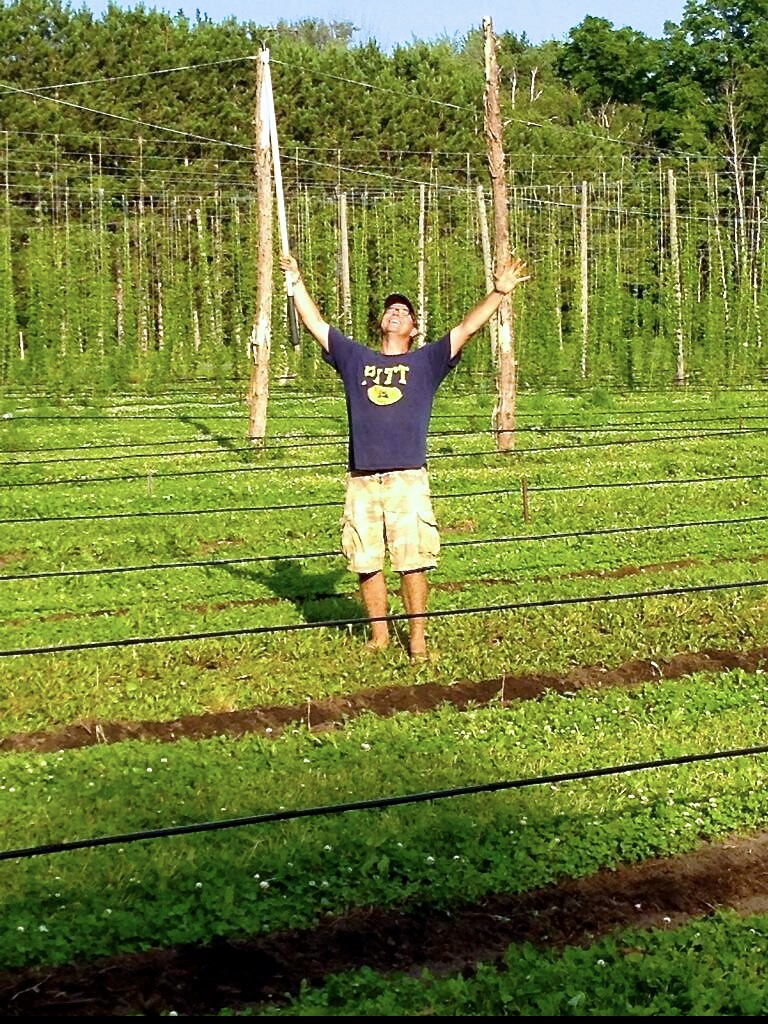Tim Wilson, with Carolinian Hop Yard, near Walsh, Ontario, is one of the few organic hop growers in Ontario and has some interesting challenges and solutions.

OHGA: When did you start growing?
Tim Wilson: The first hopyard was built and planted in 2010. We have expanded (and contracted) over the years, and hope to expand in a new location just north of the brewery.
OHGA: What varieties do you have, and how many acres?
Tim Wilson: We started with 200 plants in the first yard and then expanded the yard to 4 acres over the next few years. We eventually ended up with 10 varieties: Nugget, Sterling, Cascade, Willamette, Chinook, Crystal, Magnum, Galena, Columbus and Centennial. We removed 2 acres because of systemic downy in 2012, but plan to grow again soon in a new yard. I have been told that you are not really a grower until you actually take out a portion of your yard!
OHGA: Why did you get into the hops industry?
Tim Wilson: That’s a really good question. We didn’t have the money to start a vineyard, so that was a factor. We were fortunate to buy part of the family farm and started from there. Melanie and I always loved craft beer from our extensive travels, so we decided to give it a go. We were also fortunate to be one of the pioneers in the Ontario hop industry, catching the front edge of craft beer industry growth in Ontario. I was also attracted to growing things organically. While it’s not easy, hops are hardy enough to survive a lot of challenges. I also liked that fact that it was permaculture, as opposed to corn or soybeans. Finally, I believe hops represent an opportunity for the individual to make a difference. Just as hops take on the terroir of the land, the grower can impart their terroir on the hops they grow.
OHGA: How did you come up with your hopyard name?
Tim Wilson: We live by the north shore of Lake Erie, in the Carolinian forest region. The hop yard is surrounded on 2 sides by a beautiful Carolinian forest.
OHGA: What is your favourite piece of equipment?
Tim Wilson: My weed badger! It is the most destructive piece of equipment that we own. It leaves a destructive trail behind it but gets a ton of work done.
OHGA: What is the most challenging part of your hop business, and how are you dealing with it?
Tim Wilson: Weeds and pressures from nature itself. Being organic, we don’t have the same tool kit as conventional farmers so often we have to roll with it. As well, we keep a close eye on the economics. We have a cost ceiling that we manage to on the yard.
OHGA: Which pest/weed gives you the biggest headache, and how do you deal with it?
Tim Wilson: Interestingly, it has changed over the years. Spider mites were a problem initially, then it was Japanese beetles. They went away and then it was web worms. Downy mildew has been a big pressure the last few years. That pressure caused us to pull out 2 acres, as we felt those plants were systemic. And the weeds are non-stop – pig weed, golden rod, stinging nettle; we get them all!
OHGA: What has been a big lesson learned?
Tim Wilson: Make your rows wide enough to get your equipment through; adding 2 ft to the 2nd yard was heaven sent. As well, putting irrigation in the second year saved us a ton of labour, as we watered by hand the first year.
OHGA: What’s the one issue that you would live advice from other growers on?
Tim Wilson: I would love to hear from other organic growers, especially their challenges and solutions. You can reach me at carolinianhopyard@gmail.com
 Ontario Hop Growers' Association The OHGA is a not-for-profit association of hop growers, families and enthusiasts who are interested in supporting the growth of the hop industry in Ontario.
Ontario Hop Growers' Association The OHGA is a not-for-profit association of hop growers, families and enthusiasts who are interested in supporting the growth of the hop industry in Ontario.